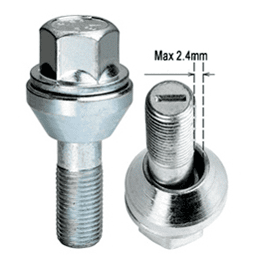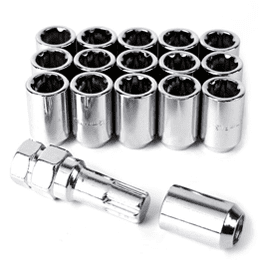Fitting Alloy Wheels
Our network of trusted retailers will know best-practice for fitting your desired wheels to your vehicle. If you choose to fit them yourselves, however, we have some top tips for getting the perfect fit!Fitting alloy wheels doesn’t have to be complicated, but there are often technical nuances which may cause you issues. Use our simple 4 step guide to fitting alloy wheels here:
Step 1 - Test Fitting
Before fitting tyres to our wheels, we advise you test fit the wheels to your vehicle first. Ensure the bolt holes line up, that the spigot aligns with the hub and that there is sufficient clearance for your suspension and brakes/callipers. Some vehicles are fitted with uprated brakes and will have larger callipers than standard vehicles. Call us for advice on test fitting alloy wheels on 01634 576657 or use our online fitment guide.
Step 2 - Extra Fittings
If rings (sometimes known as Spiggot Rings) are included in your fitting kit, they are probably needed for your vehicle and choice of wheel! Don’t leave them out. Rings are plastic or metal and fit to the back of the wheel, in the middle, known as the centre bore. They allow you to correctly mount the wheel to the hub and minimise vibration as they create a snug fit provided the bolts are correctly fitted.
Step 3 - Clearance
Check if the wheels rub. Before lowering the vehicle, spin the wheel slowly around by hand to ensure the tyre does not rub against the arches/body of the vehicle and ensure the wheel comfortably clears the calipers/brakes. Check the bolts are of the correct length and listen to hear if they catch the hub behind the wheel, if they do, the bolts are too long and you will require replacements. Please call us if you have any problems on 01634 576657.
Step 4 - Final Checks
Ensure all bolts or nuts are tightened progressively, in the correct sequence and to the correct torque as specified by the vehicle manufacturer. Ensure tyres are inflated to the correct pressure: this can affect ride, tyre wear, handling and (very important in today’s greener and financially unsteady times) fuel consumption.
Note - 'Wobbly' Nuts/Bolts
We supply all our wheel only and wheel & tyre packages with all the fixings/fittings you will need to correctly mount the wheel to the vehicle. Sometimes this may require special fixings:
• ‘Variable PCD Nuts/Bolts’: Known as ‘Wobbly Bolts’, these have a small washer/collar on the nut/bolt which allows them to adjust to the target fitment. Some examples of this would be allowing wheels with a 100mm PCD variant to fit vehicles with a 98mm PCD, or 108mm to 110mm, 110mm to 112mm, 112mm to 114.3mm (and vice versa) for example. This is a common practice in the wheel industry and is 100% safe.

You’ll be sent these fixings whenever you see this icon.
![]()
Note - 'Tuner' Nuts/Bolts
We supply all our wheel only and wheel & tyre packages with all the fixings/fittings you will need to correctly mount the wheel to the vehicle. Sometimes this may require special fixings:
• ‘Tuner Nuts/Bolts’: Some wheels, particularly those which are cross-drilled (have two PCDs drilled in them), may require a narrower nut/bolt to fix them to the vehicle, as the hole will usually only be around the 20-23mm diameter. In this instance, a normal nut will not be suitable, so ‘Tuner’ fixings will be used. Usually featuring a 12 point hex-key type or star designed hole, these are usually supplied with a ‘key’ in a similar format to locking nuts/bolts.

You’ll be sent these fixings whenever you see this icon:
![]()





